Getting everyone up to speed in a converged Himalayan newsroom
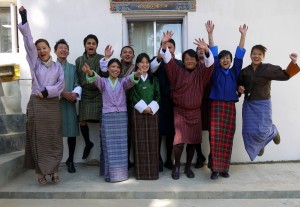 Even high in the Himalayas, reporters these days are being asked to do more.
Even high in the Himalayas, reporters these days are being asked to do more.
As part of a modernization drive, Bhutan Broadcasting Service (BBS) has combined their radio and television newsrooms. In the future, reporters will be required to provide news reports in both media. It’s hoped that the convergence will allow the state-funded station to cut costs and do more with limited resources.
It was against this background that two DW-AKADEMIE trainers went to Bhutan’s high-altitude capital Thimphu to conduct a workshop with an enthusiastic group of 12 young BBS journalists. While several already had some radio production experience, many had previously only worked on the TV side of things.
Together, the group started with a review of the basics, such as news judgment and news writing for radio, before moving on to the interview and how to ask that all-important first question that will grab your listeners and keep them from turning the dial.
![]() read more
read more
Reporting climate change in Vietnam and in Germany
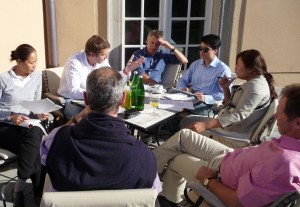 How can the media cover climate change? How do Vietnamese journalists report the topic in their country’s media and how do German journalists cover it for German audiences?
How can the media cover climate change? How do Vietnamese journalists report the topic in their country’s media and how do German journalists cover it for German audiences?
These were the key questions for the first German-Vietnamese Media Dialogue in late September 2011. Journalists from different media in both countries got together to discuss the issue in Germany. The German Federal Foreign Office had invited them to the four-day event, providing a forum for discussion, presentations and excursions. DW-AKADEMIE and GIZ-AgenZ planned and organized the event.
There are key differences in how journalists in both countries can cover environmental issues and the effects and causes of climate change. Vietnam is one of the countries worst affected by the impacts of climate change: It has a coastline of more than 3,000 kilometers and is experiencing an increase in typhoon activity, heavy rains and dry spells.
![]() read more
read more
Digitizing archives in Asia
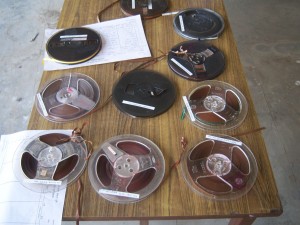 Real treasures can be found in the archives of the state broadcasters Radio the Voice of Vietnam, Radio Nepal and the Sri Lanka Broadcasting Corporation: original audio recordings from the 1930s, historic speeches, old musical recordings. All of that would be lost without painstaking restoration and archiving work.
Real treasures can be found in the archives of the state broadcasters Radio the Voice of Vietnam, Radio Nepal and the Sri Lanka Broadcasting Corporation: original audio recordings from the 1930s, historic speeches, old musical recordings. All of that would be lost without painstaking restoration and archiving work.
The three Asian broadcasters have been professionalizing their methods of archiving and digitizing audio tape as part of a long-term DW-AKADEMIE project. At this year’s International Association of Sound and Audiovisual Archives annual conference held in September 2011 in Frankfurt, Germany, three head archivists showed how their countries were preserving their cultural heritage with archive management and highly modern techniques.
![]() read more
read more
Producing “Radio for the People” in Vietnam
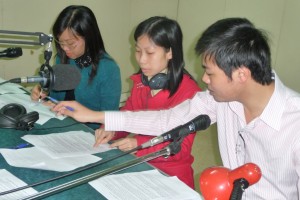 Radio listeners in Northern Vietnam’s Quang Ninh Province probably didn’t know what hit them earlier this year. Instead of drab propaganda programs, the radio was playing popular music interspersed with traffic information and listeners’ calls. And this new show was presented by a friendly host who was talking to the listeners at eye level. So far, radio hosts had sounded more like talking machines who thought it necessary to instruct the audience what to think.
Radio listeners in Northern Vietnam’s Quang Ninh Province probably didn’t know what hit them earlier this year. Instead of drab propaganda programs, the radio was playing popular music interspersed with traffic information and listeners’ calls. And this new show was presented by a friendly host who was talking to the listeners at eye level. So far, radio hosts had sounded more like talking machines who thought it necessary to instruct the audience what to think.
The program the listeners of QTV radio in Quang Ninh Province were hearing was “Rush Hour”, a one-hour morning show that the station had just started with the help of DW-AKADEMIE, Friedrich-Ebert Foundation and Vietnam’s Academy of Journalism and Communication.
![]() read more
read more
Asian media execs brush up their leadership skills in Bonn
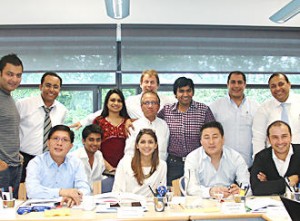 “Change management” was the catchphrase for 13 media managers from eight North African and Asian countries who attended a management training workshop in Bonn this summer. The participants discussed ways to organize transition at their respective stations. By using techniques like role play, they practiced communicating their decisions in a professional way. The training also highlighted cooperation and conflict in teams, group dynamics and key aspects of human resource development.
“Change management” was the catchphrase for 13 media managers from eight North African and Asian countries who attended a management training workshop in Bonn this summer. The participants discussed ways to organize transition at their respective stations. By using techniques like role play, they practiced communicating their decisions in a professional way. The training also highlighted cooperation and conflict in teams, group dynamics and key aspects of human resource development.
The Asian participants came from Bangladesh, Pakistan, Philippines and Mongolia. Besides visiting DW’s facilities and attending the Deutsche Welle Global Media conference ahead of the workshop, their action-packed schedule included a visit to German public broadcaster WDR in Cologne. A lively exchange with that station’s director of human resources topped off the week.
In this video, project manager Patrick Benning takes us inside the week-long workshop that was taught by DW-AKADEMIE trainer Achim Toennes. Participants Sarmad Palijo of Pakistan and Mat Verano Pareja of the Philippines describe their impressions of the visit to Germany.







